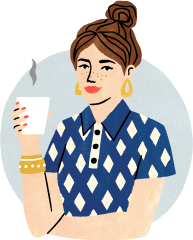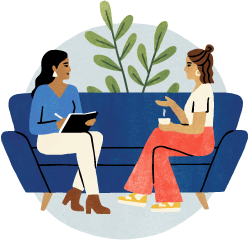Support Groups in Hope Island, QLD
There are no results for support groups in Hope Island
Check out support groups located nearby or offering teletherapy in Queensland below.More Groups Nearby
Discussion group for persons interested in reflecting and drawing guidance for Psychological Practice from the concepts developed by Alain Badiou, Gilles Deleuze and Jacques Lacan. The emphasis is on practice implications for practitioners and clients. Presentations may include: Concept overviews, Personal understandings of concepts, followed by supportive group reflections and discussions. If you are interested contact me at theiler@bigpond.com and we can discuss further, thank you.

Hosted by Elizabeth Theiler
Psychologist, MA, Australian Association of Psychologists - Member
Verified Verified
Group meets in Paradise Point, QLD 4216
I offer above all my intentional+ deep listening to your conscious/ unconscious concerns. I specialise in tailoring individually suitable therapies. I wish to assist you to open spaces, that can allow reflection and creation towards new internal+ external potentialities+ futurities, unique only to you. I am a Registered Psychologist and Psychoanalyst (Badiou/Lacan), Phd (abd level) with 50 years of expertise. I can practice in English, German or French. I am available on line, by Skype/Zoom (from anywhere in the world) + in person (at my office), by phone (Australia), for home visits (10km radius) for short and longterm therapies.
Sleep is essential but sometimes hard to come by. Learn how to improve the quality and quantity of your sleep in a supportive group setting. Medicare rebate available with a doctor's referral.

Hosted by Ruth Armstrong
Psychologist, PsychD, MAPS
Verified Verified
Group meets in Surfers Paradise, QLD 4217
Dr Ruth Armstrong is a Clinical Psychologist who provides assessments and therapy for children, adolescents and adults. She specialises in the treatment of trauma. She provides a range of interventions and is an accredited Consultant in EMDR therapy (EMDRAA) with extensive training and experience in this treatment approach.
Men's Groups and Women's Groups are starting soon: 2022.Gold Coast and Sunshine Coast areas. These groups offer a supportive atmosphere and all information is confidential. I have over 15 years experience running these groups and they are very successful. I facilitate the groups and the are available night time and during the week ends. The groups are approximately 5 - 20 people inclusive on any night. All types of issues are addressed: from Drug and Alcohol to Domestic Violence, Grief and Loss, and Self Esteem building. Please feel free to contact me at your own pace, to discuss anything with me personally. Susan.

Hosted by Susan Loane Counselling Services
Psychotherapist, AMHSW
Verified Verified
Group meets in Bundall, QLD 4217
I am an empathetic therapist with a non judgemental attitude. I value confidentiality, trust and respect for my clients. I have a huge return of clients on account of valuing and respecting my clients situation. I can meet your needs and counselling goals as I have over twenty six years experience working with clients from all walks of life. In this field experience does make a big difference to the time and quality of counselling outcomes and objectives of your seeking counselling with someone. I look forward to meeting your needs and goals too. Susan Loane.
See more therapy options for Hope Island
FAQs - About Group Therapy and Support Groups
How can I find a support group in Hope Island?
Search for nearby support groups by inputting your city, postcode, or the name of the group into the search bar. From there, you can filter to find a group that suits your needs, whether you are looking for support for a teenager, a group that focuses on a specific issue, such as depression, or a particular program type, such as one geared toward developing social skills. To navigate between locations within the same country, enter a new city or postcode into the search bar.
How does group therapy work?
Therapy groups are led by one or more therapists and serve to help people process their experiences and learn from others who understand their challenges firsthand. They can be based on a specific issue, such as addiction, grief, physical illnesses, parenting, and caregiving. They can involve a specific type of program or therapy, such as a social skills group or CBT group. They can also be specific to a particular population or community, such as teens or LGBTQ.
Support groups, like Alcoholics Anonymous, also focus on a specific issue, but are typically led by members with lived experiences and are less structured than therapy groups. Most therapy groups will meet for a fixed length of time with a consistent group of members, while many support groups meet for an indefinite period of time with members coming and going.
Support groups, like Alcoholics Anonymous, also focus on a specific issue, but are typically led by members with lived experiences and are less structured than therapy groups. Most therapy groups will meet for a fixed length of time with a consistent group of members, while many support groups meet for an indefinite period of time with members coming and going.
What are the benefits of group therapy?
Support groups help connect people with shared challenges or physical and mental health conditions. In a group setting, participants can receive support and feedback from peers and can acquire new skills, strategies and perspectives by listening to one another. Discussing your experience with someone who also has a cancer diagnosis, or whose son also struggles with addiction, for example, can help you feel less alone, reduce distress, find empathy and connection, and learn practical or medical information that has helped others. Group therapy can also be a more affordable option than individual therapy and just as effective.
Is group therapy as effective as individual therapy?
Support groups can be deeply valuable for both emotional support and/or treatment outcomes. It’s difficult to make a blanket statement on efficacy due to the many different types of support groups and conditions treated, but group therapy has been found to be just as effective as individual therapy in establishing long-term abstinence for conditions such as substance abuse, addiction and alcohol abuse.
How much does group therapy cost?
Group counselling is typically less expensive than individual counselling, with each session costing on average between $80 to $110. Meanwhile, individual therapy sessions can run anywhere from $100 to $250. It is possible to find low-cost group therapy options and many therapists offer group sessions free of charge.
Does insurance cover group therapy?
If you have private insurance, your plan may cover some if not all of your group therapy sessions. You should contact your insurance provider to determine if they provide coverage for group therapy sessions and to determine what, if any, requirements they might have in order for your sessions to be covered, such as a referral from your GP or medical specialist.
How long does group therapy last?
The length of a support group session is often one hour but can fall anywhere between 45 minutes and two hours. The amount of time that people remain in a support group varies based on their specific needs and goals and the type of therapy. Some individuals may seek a shorter-term group, such as a bereavement group, that may last between six and 20 weeks. Some may seek a longer-term group that lasts for a year or indefinitely.
What are the limitations of support groups?
Support groups have many benefits, but there are a few limitations as well. Support groups do not constitute formal therapeutic or medical treatment, and are not run by licensed mental health professionals, so some people may opt for group therapy or individual therapy instead. Additionally, support groups can depend on the other participants, so a disruptive individual has the potential to mar the group dynamic, and the anecdotal information shared may sometimes be unhelpful or inaccurate. Because it is a group setting, confidentiality can be more difficult to guard and participants receive less personalized attention than they would in an individual therapy session.

